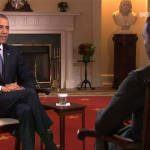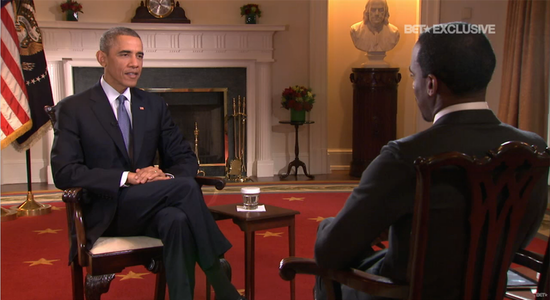
Earlier this week, President Obama sat down for an interview on Black Entertainment Television. The primary focus of the interview was the issue broadly defined as Black Lives Matter, the protests and the social movement inspired by, among other related events, the decision by the grand jury in Ferguson, Missouri, not to indict the police officer who killed Michael Brown, and a similar decision by the grand jury in Staten Island, New York, not to indict the officer who killed Eric Garner. BET News’ Jeff Johnson essentially gave the president the opportunity to explain his thinking and his response, as well …

Earlier this week, President Obama sat down for an interview on Black Entertainment Television. The primary focus of the interview was the issue broadly defined as Black Lives Matter, the protests and the social movement inspired by, among other related events, the decision by the grand jury in Ferguson, Missouri, not to indict the police officer who killed Michael Brown, and a similar decision by the grand jury in Staten Island, New York, not to indict the officer who killed Eric Garner.
BET News’ Jeff Johnson essentially gave the president the opportunity to explain his thinking and his response, as well as his broader view on the struggle for racial equality and equal justice, of which the Black Lives Matter movement is certainly a part. I want to focus here on how Barack Obama spoke about that struggle, one that stretches back not only decades but centuries:
This isn’t going to be solved overnight. This is something that is deeply rooted in our society, it’s deeply rooted in our history. But the two things that are going to allow us to solve it: Number one is the understanding that we have made progress. And so, it’s important to recognize that, as painful as these incidents are, we can’t equate what’s happening now to what was happening fifty years ago. And if you talk to your parents, grandparents, uncles, they’ll tell you that things are better. Not good, in some cases, but better.
And the reason it’s important for us to understand progress has been made is that this gives us hope that then we can make even more progress…We have to be persistent….Progress is in steps, it’s in increments….When you’re dealing with something as deeply rooted as racism or bias in any society you have to have vigilance…but you have to recognize that it’s going to take some time and you just have to be steady so that you don’t give up when we don’t get all the way there….
We’re not going to make it perfect, but we can make it better. And better is good because over time, [if] you have enough better, ten years, twenty years from now, [then] our kids are safer, the community is more confident about its place, the police officers are going to be in a position to do a better job.
In a CNN interview, Tavis Smiley, after first noting that he does “appreciate and agree with much of what the president had to say,” added that he was “galled” by the president’s emphasis on patience:
And so, for the president to suggest, to black folk, that this is going to take time; we have to be patient — that things don’t happen overnight — I get the point he was trying to make. And yet, the truth is, if he had been patient in 2008, he wouldn’t be the president tonight. So, that message of being patient, as opposed to doing exactly what folk are doing right now, I think, rings hollow.
On Sean Hannity’s Fox News show, Smiley added:
With all due respect to our President Barack Obama, black folk don’t need lectures on Black Entertainment Television. You go to Black Entertainment Television, Mr. President, respectfully, to lecture black folk and then you’re wrong, respectfully, when you tell them that these things take time….Stop telling black folk they[‘ve] got to wait, and that these things take time. We can’t wait. Number two, Mr. President, respectfully, when you say we can’t compare what’s happening now to what happened fifty years ago, tell that to the parents of these kids who are being gunned down in America’s streets. It is open season on black men, and it is in many ways as bad as it was fifty years ago.
I’m certainly not going to tell anyone whose unarmed fathers or sons or brothers were killed by police officers how they should feel, or whether things are better or worse for them. Certainly, when the president makes the point that real progress has been made over the past five decades — whether we are talking about voting rights or even the basic question of whether it is illegal to discriminate on the basis of race — I’m sure that Tavis Smiley would agree. To deny that progress would be to ignore the sacrifices made by those who fought and bled to achieve it, as the president has said numerous times.
On the matter of patience, let’s recognize what the president is most emphatically not doing. He is not saying that achieving our goals will take time because he wants people to stop protesting and wait patiently for progress. He did not, as Smiley charged, preach “being patient, as opposed to doing exactly what folk are doing right now.” Obama is not telling people that they need to stand down because now is not the time to struggle. He is, in fact, saying exactly the opposite. He is encouraging them to be ready for a long struggle, because, in Obama’s words, we have to be “persistent,” “vigilan[t],” and “steady.” And, although he is optimistic about the long-term prospects for the fight against bigotry, he noted, “We can’t just wait for that process to happen on its own.” Does that sound like someone who is “opposed” to “what folk are doing right now?”
One reason why some people protest — at least in part — is to express their anger and their pain. Beyond this, the Black Lives Matter protest movement aims to make profound changes in our society. People who organize or even simply participate in such a movement are, by their very actions, evincing a belief in the possibility of success, in the possibility of progress. Otherwise, what would be the point?
President Obama encourages protestors and organizers to have hope, and to do what he has also promised to do, namely to “stay on this.” He paraphrased Frederick Douglass’ point about power conceding nothing without a demand. Douglass’ larger argument was to counter those who counseled against “agitation” and “struggle,” adding: “If there is no struggle, there is no progress.” Clearly, Obama agrees, and that is why he emphasizes progress and hope, to encourage us to keep on struggling.
Hope that we can achieve full justice and equality fuels our movement. We protest because we have hope that we can achieve more progress. The president praised “the value of activism, organizing, peaceful protests, [which] reminds the society, ‘This is not yet done.'” — while calling violence “counter-productive.” He added that these peaceful protests are “necessary.” Our country needs them.
And yes, there is reason to believe, to have hope that activism can continue to bring about change. Just within the last couple of years, activists fought against the stop-and-frisk policy that disproportionately targeted young black and brown men in New York City. Activists protested in the streets and fought in the courtrooms. They won.
If all is lost, then there’s no reason to try and win. But all is not lost. We have won tremendous victories on civil rights and equality for everyone. We’ve also suffered setbacks. But we cannot give up. We will not give up. In fact, we shall overcome.
Original post:
Obama Is Right to Emphasize Progress and Hope — If There’s No Hope, Why Bother Fighting?




















